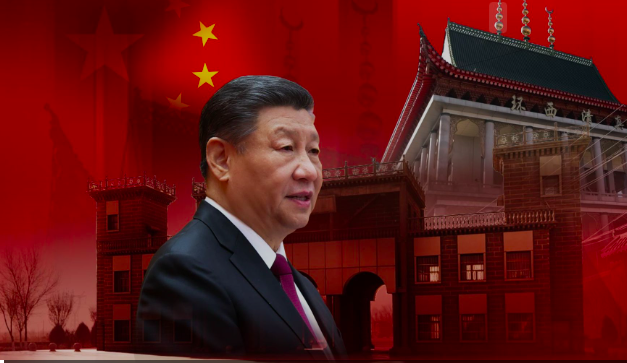Uyghur Research Institute | Translated by: Turkistan Times
On September 30, 2025, the Xinjiang daily, the official voice of the Chinese government, published a report on its front page stating that Xi Jinping, during the 22nd collective study session of the CCP Central Committee's Politburo, emphasized the following: "We must systematically advance the Sinicization of religion in our country and actively guide religion to adapt to socialist society." For every East Turkestani, every letter and every word of this report is not merely ordinary information but a cold reality signaling a new phase in the systematic assault on our national existence and religious faith.
This report from September 30, 2025, appears on the surface to be a report on a routine study session for the top leadership of the Chinese Communist Party. However, hidden between these lines is the most sinister draft of a heinous plan to destroy our religion, our identity, and our culture. Though it seems like a simple news item, it is, in fact, a political declaration and a roadmap for a cultural genocide. The phrase "Sinicization of religion," which forms the core of the report, does not mean the integration of religion with local culture, but rather its complete submission to communist ideology and the replacement of its spirit with Chinese culture. The phrase "actively guide its adaptation to socialist society" is a political veil for violent means such as "coercion," "control," and "punishment."
To achieve this political objective, Xi Jinping's speech puts forward concrete tools for the reconstruction of a nation's spiritual world. He demands the establishment of a "correct view of the state, history, ethnicity, culture, and religion" and promotes the need to strengthen the "five identifications." This "five identifications" concept was introduced by the Chinese Communist Party (CCP) in 2015 as: "identification with the great motherland, the Zhonghua nation, Zhonghua culture, the Chinese Communist Party, and socialism with Chinese characteristics." In reality, the "five identifications" is a direct assault on the collective memory and identity of the people of East Turkestan.
This is an attempt to force us to deny East Turkestan's tradition of free existence and its history, and to accept it as having "always been a part of China"; to forget that we are an independent Turkic nation and instead view ourselves as a part of the artificial concept called the "Zhonghua nation" centered around China; and to understand Islam not as a revelation from Allah, but as a "cultural phenomenon" permissible only within the confines drawn by the Party.
This ideological assault is being carried out in tandem with an effort to eradicate cultural roots. The demand emphasized in the speech for "religion to take root in the soil of China and integrate/unify with Chinese culture" aims to sever the organic bond between Islam and its glorious thousand-year history in East Turkestan and its Turkic-Islamic culture. Actions such as demolishing the domes and minarets of mosques and replacing them with Chinese-style roofs, raising red flags in religious courtyards, and forcing imams to recite state slogans and memorize Xi Jinping's words alongside Quranic verses find their "theoretical basis" in this very sentence. This situation forces the people of East Turkestan to choose between Allah and the Chinese Communist Party.
To implement this oppression, the Chinese government employs a two-faced tactic. Article 36 of the Constitution states: "Citizens of the People's Republic of China enjoy freedom of religious belief," "No state organ, public organization or individual may compel citizens to believe in, or not to believe in, any religion; nor may they discriminate against citizens who believe in, or do not believe in, any religion," and "The state protects normal religious activities." However, the same article adds: "No one may make use of religion to engage in activities that disrupt public order, impair the health of citizens or interfere with the educational system of the state," and "Religious bodies and religious affairs are not subject to any foreign domination." Consequently, the contradictory nature of Article 36, where the latter part negates the former, reveals the two-facedness of the CCP on the issue of religion and belief.
On one hand, under the pretext of "promoting self-reform within the religious sphere," it attempts to corrupt religion from within through puppet religious figures under its control. Through this method, it aims to deceive the public by presenting the imposed changes as the "will of the religious community itself." On the other hand, under the slogan of "managing religious affairs according to the law," it turns the law into an instrument of oppression. Normal religious activities such as growing a beard, praying, and fasting are defined as "extremism" and "illegality," thereby providing a legal facade for its genocidal actions.
In conclusion, Xi Jinping's speech does not introduce a new policy. On the contrary, as indicated in the OHCHR report of August 31, 2022, it is an attempt to expand the systematic cultural genocide that has been ongoing in East Turkestan for years to the whole of China, and to "perfect" and "deepen" it on a theoretical level. The publication of this news in a local newspaper in East Turkestan in 2025 indicates that this oppression will become even harsher and penetrate into finer details in the future. However, no political power has been able to, or will be able to, eradicate the faith of a nation that has been rooted in its heart for thousands of years with speeches on paper or tools of violence. This campaign is not a sign of the Chinese government's strength but, on the contrary, an expression of its weakness and fear.

